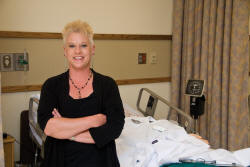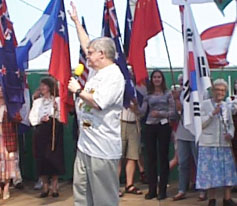December 9, 2009
|
In March 2010, Huntington University’s EXCEL Adult Degree Programs will begin offering a Bachelor of Science degree in Nursing (BSN) for registered nurses.
Classes will be held on Thursdays from 6 to 10 p.m. on the university’s main campus.
The RN to BSN program seeks to build on the experience and education nurses already have gained in the field, and to teach nursing theory, leadership, and care through a Christian lens.
Students will complete the nursing core in less than two years. The program consists of 17 courses comprising 49 credit hours. These courses include Bible and writing as well as nursing courses such as research, ethics, and current issues in nursing.  Transcripts from previous educational institutions will determine the amount of transferable coursework and the courses needed for graduation.
Transcripts from previous educational institutions will determine the amount of transferable coursework and the courses needed for graduation.
“Our program is designed for adult learners who work and have family responsibilities,” said Diana Shenefield (right), an R.N. and instructor in nursing.
She added that the university’s smaller size allows for a more student-centered approach to learning.
“Students have more of an opportunity to speak out in class,” Shenefield said. “They can ask questions as well as engage the professor in dialogue in and outside of class.”

 Mark Ralph will become senior pastor of Lakeside Evangelical Congregational Church (Transfer, Pa.) effective January 1, 2010. Since 1975, Mark has been a pastor at Brown Corners UB (Clare, Mich), Shepherd Street UB (Charlotte, Mich.), and a UB church planter in Birmingham, Ala. Most recently, he was senior pastor of Sunfield UB (Sunfield, Mich.) 1997-2009. Mark has roots in the Evangelical Congregational Church, where his father was a pastor for 28 years. Mark himself pastored in the EC church 1981-1983.
Mark Ralph will become senior pastor of Lakeside Evangelical Congregational Church (Transfer, Pa.) effective January 1, 2010. Since 1975, Mark has been a pastor at Brown Corners UB (Clare, Mich), Shepherd Street UB (Charlotte, Mich.), and a UB church planter in Birmingham, Ala. Most recently, he was senior pastor of Sunfield UB (Sunfield, Mich.) 1997-2009. Mark has roots in the Evangelical Congregational Church, where his father was a pastor for 28 years. Mark himself pastored in the EC church 1981-1983. Transcripts from previous educational institutions will determine the amount of transferable coursework and the courses needed for graduation.
Transcripts from previous educational institutions will determine the amount of transferable coursework and the courses needed for graduation.